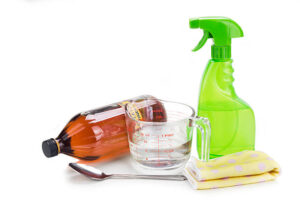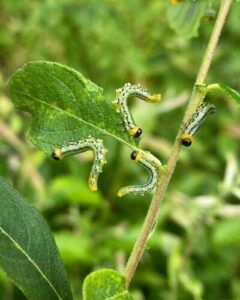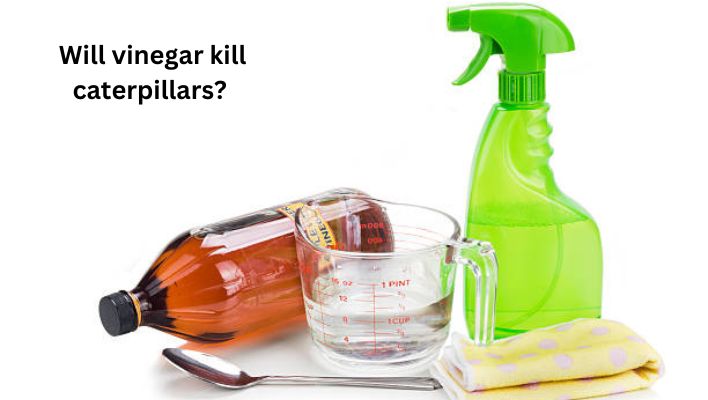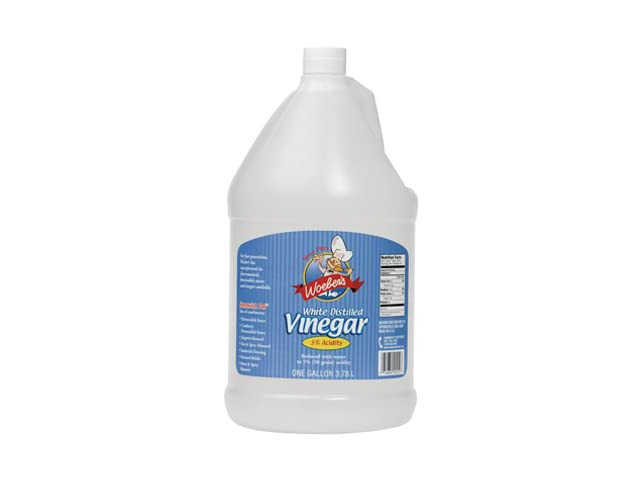Using home remedies to eliminate pests in your garden is usually a cost-effective way to keep your garden healthy and safe. The truth is some home remedies work better than others when dealing with common garden pests. Vinegar is a popular household item used as an insecticide against numerous pests, but will it kill caterpillars?
Vinegar is a powerful disinfectant; it has been used for centuries to disinfect wounds, kill germs, and clean surfaces. A dilute solution of vinegar, between 5-10% concentrations, will cause the death of many insects.
This makes it a natural insecticide that can be used to kill various types of caterpillars. It also has an odor that repulses other insects, so it’s an effective deterrent against pests like flies, aphids, mealybugs, whiteflies, and many more.
However, you need to be careful because vinegar can kill your plants. Vinegar contains acetic acid, which can burn your plants when used too frequently or with too much on plants. Below is everything you need to know about using vinegar on your plants to kill caterpillars
How vinegar kills Caterpillars
Vinegar is one of the oldest methods of killing caterpillars, and it’s still one of the best. It is cheap, which makes it an easy choice for DIY pest control.
The type of vinegar you use doesn’t matter: white vinegar works just as well as balsamic or apple cider vinegar. You can add a little liquid dish soap if you want to kill them quickly (soap kills on contact).
The acetic acid in vinegar makes it a highly effective insecticide. It kills through dehydration, which means it draws moisture out of their bodies, and they die from a lack of oxygen.
It also contains malic acid, which inhibits calcium absorption in the insects’ bodies, causing them to lose their ability to move around and resulting in death from dehydration.
The Good thing about vinegar is that it doesn’t have any harmful effects on humans or animals. It will also kill any bugs in the area, so there’s no need to worry about any collateral damage from your homemade spray.
Also, it can be used in many different ways. You can mix up a spray for your garden to eliminate pests like aphids, mealybugs, and mites or use it as a preventative measure against pests like mosquitoes and flies. If you’re looking for something more DIY-oriented, you can make your homemade bug spray by combining water and white vinegar in a spray bottle.
How to kill caterpillars with vinegar
Caterpillars are a common problem in gardens and lawns. They can be a nuisance because they eat leaves, flowers, and other plants. If you’re trying to kill caterpillars, you need something that will both repel them and kill them.
Vinegar contains acetic acid, which is effective at repelling and killing insects when they come in contact with it. It works by dehydrating them and killing their eggs, and it is one of the popular options out there, but not the best.
You can use common white vinegar or apple cider vinegar; both work equally well for this purpose. You can also use it as a spray on your lawn or garden to deter the insects from moving there in the first place.

Follow these steps:
- Mix 4 cups of water with two tablespoons of white or apple cider vinegar in a spray bottle or other container.
- Spray on the leaves where you see caterpillars (you may need to do this once every two weeks).
- Wait at least 24 hours before watering your plants again because some solutions may have been absorbed into the soil.
Note: The best alternative is to spray bacillus thuringiensis (BT) or hand-pick caterpillars and drown them in a bucket filled with vinegar or neem solution.
Vinegar will repel caterpillars.
Many people who have tried vinegar to deter caterpillars have found it works well in keeping them away. Combining vinegar with water creates a solution that can be sprayed on plants and trees to keep caterpillars at bay.
This way, vinegar can also be used as a pesticide to kill crawling insects like earwigs. It is also effective against roundworms, slugs, snails, and aphids.
Vinegar kills insects by dehydrating them or by changing the pH levels in their bodies, which causes them to die from a lack of oxygen. Vinegar repels caterpillars by making the environment less attractive to them; It’s an acidic substance that they don’t like at all; it can kill or irritates them, making them uncomfortable and moving on.
Also, vinegar is a disinfectant, which can help you keep the area clean after you’ve killed the caterpillars. So, if you want to ensure that your plants are protected from pests for longer than a couple of weeks at a time, then using vinegar as an insecticide may be worth considering for your garden or yard.
You can spray your plants at least once a week with a vinegar solution to keep pests at bay. However, using too much vinegar on your plants will damage your plants and probably kill them.
Side effects of using vinegar to kill caterpillars
If you’re using vinegar to wash or spray your plants, you need to ensure that you only use a small amount. The acidity of vinegar kills the bacteria and fungi that cause plant diseases. However, you don’t want to use too much vinegar on your plant leaves because it can burn and kill them.
Applying vinegar to your plants’ leaves can cause them to dry and crack. This can damage the plant’s ability to photosynthesize, causing it to lose its green coloration and become brown or gray in appearance. It can also cause harm if used on soil: it will kill the good bacteria in your soil, which can negatively affect your plant’s health.
Vinegar is a popular method for caterpillar control, but it has some disadvantages.
- Using vinegar too much can damage plants in the area where it’s sprayed
- Vinegar can be harmful to caterpillars and other beneficial insects.
However, If you notice that your plant has been damaged by using vinegar on it, here are some steps you can take:
- Immediately rinse the area with water so that any excess vinegar can be removed
- Apply a diluted solution of baking soda and water (1 tablespoon per quart of water) after rinsing with water; this should help restore your plant’s health.

Other natural ways to get rid of caterpillars
Hand Pick Caterpillars
One of the best effective methods to get rid of caterpillars is by hand picking them and crushing them with feet or drowning them In vinegar solution.
However, this is a stressful method involving checking the whole garden, which can be time-consuming. You can use gloves; hand-picking puts less stress on your plants if you do it right (as long as they aren’t too big).
Use Bt (Bacillus thuringiensis)
There are many ways to get rid of caterpillars, but one of the most effective methods is to use a product called Bacillus thuringiensis (Bt). This particular bacteria can harm and kill caterpillars, which makes it an efficient and easy solution for getting rid of them. The only downside is that it does not work on all types of caterpillars, so it may not be the best solution for you.
It’s also known as “biopesticide.” You can buy bt online or in stores, but it’s easy to grow at home! Here are some ways you can use bt to get rid of caterpillars:
- Sprinkle some bt around your garden. This will kill any caterpillars that eat the leaves of your plants.
- Use a sprinkler to water your plants with bt every day during the summer. This will kill any bugs that try to eat them!
Encourage predators
Another good way to get rid of these pesky creatures without harming yourself is by encouraging predators. You’ll want to ensure your area is safe for birds and other animals, so look into creating places where they can hang out or nest. Also, you can attract them by growing plants they love.
Encourage predators by adding plants that attract them. Some plants can also be used to attract ladybugs, which will eat the caterpillars. These plants include
- Aromatic plants: Dill, tansy, rosemary, etc. This attracts insects that lay their eggs in the plants, hatching and eating them.
- Flowering plants: Lavender, marigold, sunflowers, and others. These attract predatory insects like hoverflies and parasitic wasps that paralyze caterpillars while they eat them alive.
- Chrysanthemums attract parasitic wasps (often found on chrysanthemums), which attack the caterpillar’s body and lay their eggs inside it. The caterpillar dies from an infection caused by the wasp’s larvae inside it.
- Scarecrows: these scare away predators and encourage them to stay away from your garden!
Sprinkle with Baking Soda
Baking soda is an excellent insecticide and can help eliminate them once and for all. You will need to apply it to the affected areas several times during the day. It is safe for plants and pests, making it a good insecticide.
Mix 1/4 cup baking soda with 1 gallon of water in a bowl. Pour the solution into a spray bottle and spray it on your plants until you see no more caterpillars. You can also sprinkle baking soda on top of your garden and watch as the caterpillars start dying from the inside out.
Garlic Oil Spray
Garlic oil can be applied to your plants and trees, but you should be careful about the amount you use. You don’t want to kill your plants or trees with too much garlic oil. You can also use crushed garlic on your garden or lawn to repel pests.
Just make sure that you don’t put too much garlic in one area because it can be toxic for plants and animals alike if it gets into their systems through their skin or digestive systems (or both). You can also mix it with water and spray it on your plants or garden area to keep the insects away.
You’ll need the following:
- 1 tbsp olive oil (or any vegetable oil)
- 1 tsp garlic powder (or fresh minced garlic)
- 1 cup water
Mix all ingredients in a bowl until the mixture is smooth. Spray the mixture on your plants, or use it outside your home, and watch as it repels pests.
Use Borax
Borax is one of the most effective natural ways to eliminate caterpillars. It’s a great option for people who don’t want to use pesticides but also want their garden to be as pest-free as possible.
Borax works by controlling the moisture levels in your home, which helps prevent eggs from hatching and larvae from maturing into adults. It also kills caterpillars on contact and is relatively nontoxic—so you won’t have any nasty side effects if you use it in your home.
The best part: it’s very easy to use! Just sprinkle some borax powder around where you’ve seen caterpillars, such as under plants or on window sills, and let it sit overnight. In the morning, vacuum up any remaining powder with a brush attachment.
Another good way to use it is to mix it with some water and then spray it on your plants. This will kill off any caterpillars and prevent them from coming back.
Spray with Neem Oil
One of the easiest and most effective ways to get rid of caterpillars is by using a spray made from neem oil.
The spray will also repel other pests, such as fleas and mites. You can also use neem oil as a household insecticide or in your garden by mixing it with water and applying it with a spray bottle or hose-end sprayer.
It’s a natural pesticide that has a variety of benefits for your garden and home, including being both safe for humans and pets, as well as being easy to use.
To make a spray from neem oil, you’ll need:
- 1 tablespoon of neem oil
- 1/3 cup of water
- 1/2 tsp of dish soap
Mix all ingredients in a spray bottle. You may wish to add additional neem oil if you think it’s necessary; however, be careful when adding more than the recommended amount because too much can be harmful to plants and animals. Once mixed, shake well before spraying on your plants or garden area.
Use Diatomaceous Earth
Diatomaceous earth is made from the fossilized remains of microscopic water creatures called diatoms. The diatoms leave a powdery residue harmful to caterpillars and other insects. When applied as directed, it will kill any caterpillars that come in contact with it.
Diatomaceous earth is sold in different forms, including powder, flakes, and pellets. You can use any type you prefer; the most important thing is to use a brand with enough DE to kill the insects on contact.
Sprinkle it onto the outside of your home where caterpillars are congregating (such as near plants or shrubs). Also, sprinkle it around your garden or yard if you’re having trouble with them crawling in there. You can also mix it with water and spray your garden.
Use Companion Planting
Companion planting is when you plant different kinds of plants together so their roots can work together and make each other stronger than they would if they were alone. This is great because it will help both plants survive longer and protect them from pests that could destroy the garden.
It’s also a great way to attract beneficial insects into your garden and have them keep other pests away from your plants.
You can start by planting a few different types of flowers around the plants being attacked by caterpillars, like nasturtiums, marigolds, and zinnias. These flowers will help repel the caterpillar from eating the leaves on those plants.

